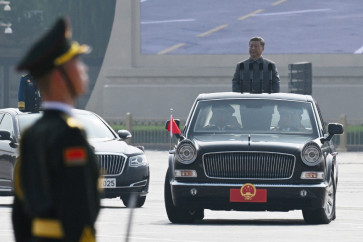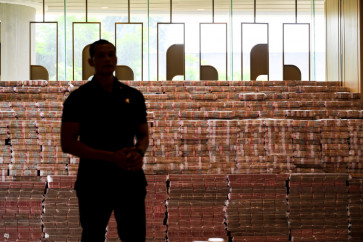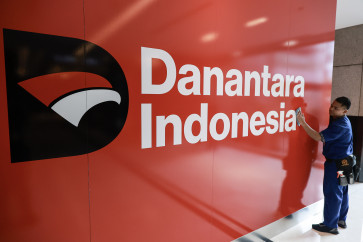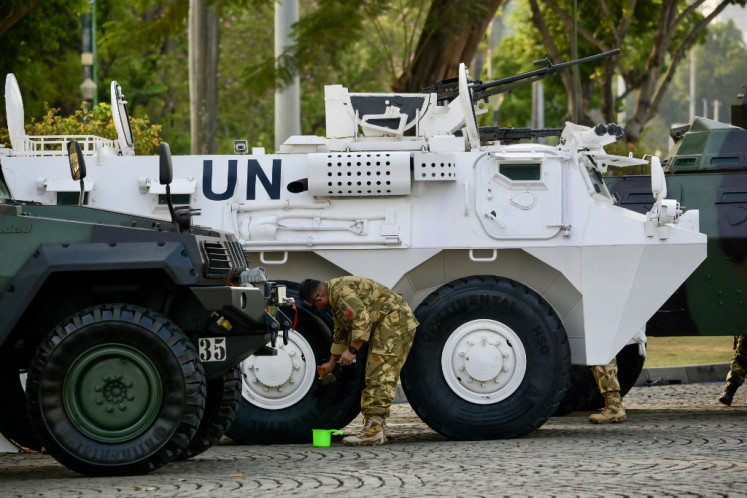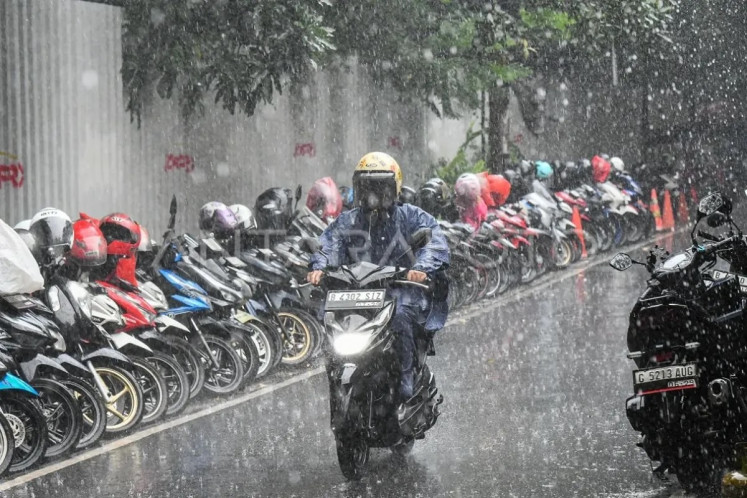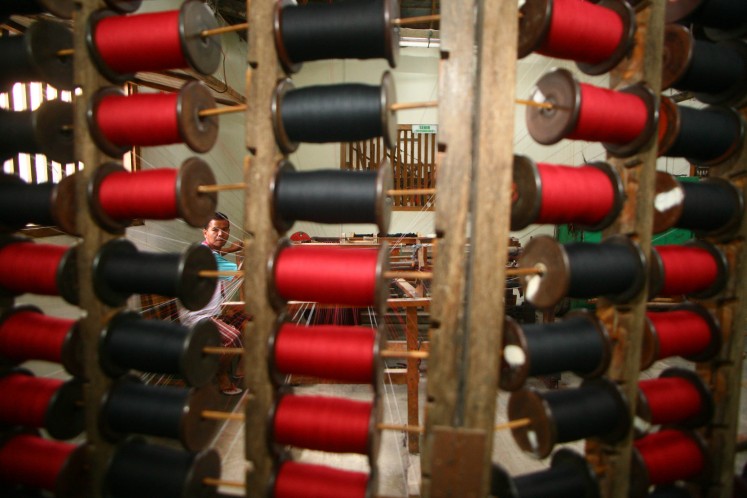Popular Reads
Top Results
Can't find what you're looking for?
View all search resultsPopular Reads
Top Results
Can't find what you're looking for?
View all search resultsJakarta Biennale: aims to embrace global vision
Siasat project mural The Popo
Change text size
Gift Premium Articles
to Anyone
 Siasat project mural The Popo.(Jakarta Biennale)" border="0" height="342" width="511">Siasat project mural The Popo.(Jakarta Biennale)
Siasat project mural The Popo.(Jakarta Biennale)" border="0" height="342" width="511">Siasat project mural The Popo.(Jakarta Biennale)The upcoming Jakarta Biennale is expected to move forward and apply some changes to its original concept. These changes are hoped to make the event one of the worldâs most important international artistic gatherings.
Renowned British art curator and author Charles Esche will act as lead curator for this yearâs Biennale, and has said that the Indonesian art community must identify their own âmoment of dangerâ in order to expand local arts.
âThis moment of danger is what motivates us humans to find solutions and is often the driving force of experimental culture,â he said recently at a public lecture at the Auditorium of Faculty of Humanities at University of Indonesia campus in Depok, West Java.
âThe world is no longer solely looking into Indonesian traditions but also how they fit in the international arena. There is a relationship between bringing the world into the Biennale and to take the Biennale out into the world,â added Esche.
Titled âArt, Society and the World Nowâ, the public lecture was organized by the British Council and constituted one part of a series of such events in Jakarta and Makassar related to artistic gatherings and the world of contemporary art.
Esche, currently working as the director of the Van Abbemuseum in Eindhoven, the Netherlands, shared his experiences as a curator for a number of events, including the Gwangju Biennale of South Korea in 2002 and last yearâs Sao Paulo Biennial in Brazil.
He said that the next Jakarta Biennale could be as successful as both Gwangju and Sao Paulo in catapulting local artists and art communities to the attention of the world.
Esche suggested combining the biennale model of location used in Gwangju with an antagonistic concept â making a political point of view â such as that employed in Sao Paulo for Jakarta.
Esche said that Jakarta possessed all of the necessary elements, and that he would plan to put Ciliwung River, the largest and longest river that runs through the city, at the center of the art event.
âFrom there we can talk about history, the identity of the people, water issues, pollution, poverty, women rights and many other things,â he said.
âThe location itself is a pull factor as the world is now looking at Indonesia. Imagine an international kampong as the world comes together in one place. Contemporary art and the contemporary world in one place. The other factor is the activities that are connected to it. I hope we will make a good exhibition,â he added.
The Jakarta Biennale, themed âMaju Kena, Mundur Kena: Bertindak Sekarangâ (Learning from the Present: Act Now), will be opened on Nov. 14 at the old warehouse of Indonesiaâs oldest department store Sarinah. A string of public events and six community projects and exhibitions will last until Jan. 17, 2016.
The other speaker at the public lecture, historian and social activist Hilmar Farid, underlined on how art changed dynamically to more accurately reflect the current world.
 Siasat project mural The Popo.(Jakarta Biennale)<)
Siasat project mural The Popo.(Jakarta Biennale)<)
Siasat project mural The Popo.(Jakarta Biennale)
The upcoming Jakarta Biennale is expected to move forward and apply some changes to its original concept. These changes are hoped to make the event one of the world's most important international artistic gatherings.
Renowned British art curator and author Charles Esche will act as lead curator for this year's Biennale, and has said that the Indonesian art community must identify their own 'moment of danger' in order to expand local arts.
'This moment of danger is what motivates us humans to find solutions and is often the driving force of experimental culture,' he said recently at a public lecture at the Auditorium of Faculty of Humanities at University of Indonesia campus in Depok, West Java.
'The world is no longer solely looking into Indonesian traditions but also how they fit in the international arena. There is a relationship between bringing the world into the Biennale and to take the Biennale out into the world,' added Esche.
Titled 'Art, Society and the World Now', the public lecture was organized by the British Council and constituted one part of a series of such events in Jakarta and Makassar related to artistic gatherings and the world of contemporary art.
Esche, currently working as the director of the Van Abbemuseum in Eindhoven, the Netherlands, shared his experiences as a curator for a number of events, including the Gwangju Biennale of South Korea in 2002 and last year's Sao Paulo Biennial in Brazil.
He said that the next Jakarta Biennale could be as successful as both Gwangju and Sao Paulo in catapulting local artists and art communities to the attention of the world.
Esche suggested combining the biennale model of location used in Gwangju with an antagonistic concept ' making a political point of view ' such as that employed in Sao Paulo for Jakarta.
Esche said that Jakarta possessed all of the necessary elements, and that he would plan to put Ciliwung River, the largest and longest river that runs through the city, at the center of the art event.
'From there we can talk about history, the identity of the people, water issues, pollution, poverty, women rights and many other things,' he said.
'The location itself is a pull factor as the world is now looking at Indonesia. Imagine an international kampong as the world comes together in one place. Contemporary art and the contemporary world in one place. The other factor is the activities that are connected to it. I hope we will make a good exhibition,' he added.
The Jakarta Biennale, themed 'Maju Kena, Mundur Kena: Bertindak Sekarang' (Learning from the Present: Act Now), will be opened on Nov. 14 at the old warehouse of Indonesia's oldest department store Sarinah. A string of public events and six community projects and exhibitions will last until Jan. 17, 2016.
The other speaker at the public lecture, historian and social activist Hilmar Farid, underlined on how art changed dynamically to more accurately reflect the current world.
Siasat project mural Eko Nugroho. (Jakarta Biennale)
Contrasting images of walls erected to separate Israelis and Palestinians with the fallen Berlin Wall, Hilmar said history recorded that the issue of segregation arose in times of crisis.
'In Indonesia we can see that there is a social gap by the presence of high brick walls separating the rich from the poor. The Biennale is one of the platforms we can use to bring down the barriers by bringing classes together.'
Both speakers also talked about the need of art critics and curators to make art works relevant to people.
'Critics should restrain from commenting on how good an artist or a work is, but should start to look at the story the art is trying to tell and what it means to the world,' said Hilmar.
Esche said that while tension between curator and artist was often unavoidable, a good curator was responsible for bringing about change.
'Change means thinking historically and the idea of thinking historically is to make the world understandable.'
Historic changes have been implanted in this year's Biennale as for the first time it will include six emerging Indonesian curators.
They are Anwar Jimpe Rachman from Makassar, Benny Wicaksono from Surabaya, Putra Hidayatullah from Aceh and Asep Topan, Irma Chantily and Riksa Afiaty from Jakarta.
'The key thing we do is transfer knowledge,' said Irma, a lecturer at the Jakarta Arts Institute (IKJ). 'We learn from each other.'
Also for the first time, the event was organized by Yayasan Biennale, a foundation that was established last year to replace the partnership between the Jakarta Arts Council (DKJ) and the city administration.
Jakarta Biennale executive director Ade Darmawan said that the foundation would be partnered with Sarinah, Denmark's Center for Culture and Development, the British Council, the University of Indonesia, Hasanuddin University in Makassar, South Sulawesi, and a number of art communities throughout the country.
A total of 60 artists will take part in the Biennale and Indonesian artists will make up 40 of the 60 participants.
Putra said that the notion of contemporary art was still a foreign concept in Banda Aceh.
'There is a mural artist who has painted all that had happened in Aceh from the 1980s but the work is still unrecognized. I hope this year's Biennale could be the right moment to talk about our history.'


